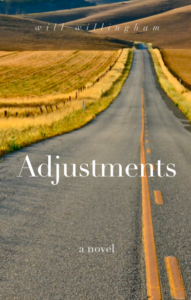I have a special kind of affection for a woman named Pearl Jenkins.
She’s a seventy-something widow who from time to time finds herself at the center of speculation as to whether or not she arranged for the demise of her difficult husband. She presides over a once-majestic home in the rural Dakotas filled with stained glass and boasting a ballroom on the third floor, though now that the kids moved on, her own slow dance with age has shrunk her once grander life and the house has become more of an elegant space to warehouse memories and might-have-beens.
With her silver hair pulled into a soft, stately bun, Mrs. Jenkins is two parts Katharine Hepburn and one part Helen Mirren with a dash of Gilda Radner for good measure. She makes coffee the old fashioned way, bakes an apple pie unequalled in the history of pastries, and seeks to assuage her own profound loneliness by innocently inviting beautiful romantic prospects to meet her still-single tenant, only to shoo them away when she remembers she could find herself even more alone were she to succeed in pairing him off.
Her sharp wit and warm laugh could easily carry you into tomorrow. And the lucky person to whom Pearl takes a fancy will soon discover that while she might expect the universe from him (and will demand it with the stinging snap of a wet dish towel) she will move heaven and earth herself for him without a moment’s hesitation. Well, perhaps there will be momentary hesitation. And a small speech. And the occasional reminder for years to come. But the location of heaven and earth will be adjusted, all in due time.
I love this woman dearly. Which reminds me I have a confession to make:
Pearl Jenkins is not a real person.
I came to writing fiction much the same way I came to poetry, via a healthy skepticism and even subtle mockery from time to time (cue the complaint that poetry is nothing more than “cryptic nonsense”). I scoffed quietly at fiction writers who talked about their characters as though they were real people. “My protagonist just decided to buy that black Lamborghini. Didn’t see that coming, ” I would read on Twitter. Clicking the author’s Unfollow button, I’d mutter, “You’re the writer, for crying out loud. You saw it coming.” Another was bereft at the death of a beloved character, as though she herself didn’t wield the pen, or in this case the knife, that she wrote plunging into the character’s chest. Unfollow again.
And then? And then came Pearl Jenkins.
It was true. I didn’t see her coming. When I started writing Adjustments, I began with two characters I knew (and a pair of roller skates). Will Phillips and Joe Murphy are not real people, but they started with a kernel of a real person and developed into their own fictional characters. I knew nothing of Pearl, who first appeared as a nondescript benefactor in Chapter 3, who’d given Will a bag of chocolate chip cookies that he shares with Joe. I had no idea when I mentioned the landlady in that scene if she would appear in the story again. I certainly didn’t know she would become the woman she is today.
She did come back into the story, and I would understand later that she had emerged in the story to hold up a mirror of sorts to Will Phillips so that we could see his character develop. But at a certain moment in Chapter 9, I realized she had her own place in the story, and her own complex and delightful personality. In the scene, Will has crawled out the window from his bedroom and is reading poetry on the porch roof when he accidentally knocks the book off the roof, only to realize that his landlady is watering flowers alongside the house where the book lands.
Pearl bent over and picked up the book. “And Keats, Mr. Phillips? Am I to believe you were on my roof reading John Keats?”
“Well, umm, yes, ” Will said, figuring there was no better story than that.
“I have never heard of anything so ridiculous in all my life.” Pearl tucked the book under her arm and strutted away. She stopped after just a few steps, turned back and looked up at Will, who was still peering over the edge of the eave. Something flashed across her jet black eyes. Maybe anger. Maybe mischief. Will wasn’t sure.
“I’ll have you know, William Phillips, that when I was a girl, I only read Emily Dickinson on that roof. It’s no place for John Keats.”
Pearl is the sort of woman who would rather read Dickinson than Keats, and would expect you to agree. But she would also expect you to read them both to figure out why.
Before I wrote my first word of fiction, I thought that a good story was all about the plot, and that characters were there just to make things happen. And then Pearl Jenkins showed up and made me think it might work the other way around.
Pearl Jenkins is a woman who grew out of a story and who seems as real to me, most days, as the universe she keeps shifting around.
Photo by Ginny, Creative Commons license via Flickr. Post by Will Willingham.

As much as the characters have a relationship with poetry and story (and they do), it is also a profound book about naming both the things that have held us back and the things we want, to move us forward—about choosing life. While it plays at the level of a few characters’ personal journeys, it is ultimately a novel for our time.
- Earth Song Poem Featured on The Slowdown!—Birds in Home Depot - February 7, 2023
- The Rapping in the Attic—Happy Holidays Fun Video! - December 21, 2022
- Video: Earth Song: A Nature Poems Experience—Enchanting! - December 6, 2022

S. Etole says
It’s been a pleasure to meet her through your story. Following along since the beginning …
LW Willingham says
Susan, thanks so much for reading and commenting. Very glad you are enjoying the story. 🙂
L. L. Barkat says
Oh, I do love Pearl too. She certainly knows how to put that Will character in his place. While also clearly loving him.
As for the issue of characters having a life of their own, I think if they don’t then the story probably shows it. Too predictable. Too cliche. I’m glad she showed up out of nowhere 🙂
LW Willingham says
I truly did not expect to have any affection for my characters. Or even to call them my characters. 😉 But it’s true, a writer does get to know them as the writing progresses. It’s funny how many things I “know” about them that may never make it into the story. 😉
Megan Willome says
And yet another evolution in the world of writing! I blame poetry for wreaking this mischief.
P.S. What do you think Keats and Dickinson would have thought of each other, had they had a chance to meet?
LW Willingham says
I think they might enjoy sitting on the porch roof together. 😉
Robert Wilde says
First I am really enjoying the series and look forward to the Tweetspeak newsletter each week. I’m not much of a writer but I am an omnivorous reader and have been reading a lot by 30-something writers lately. I’m 71, rapidly approaching 72, and work with a number of 70-something volunteers at my local history center. I think Pearl could give Cameron Julian a run for her money with Will. He might want to think about that a little more seriously. Think of silver as platinum blond and there are some pretty hot 75 year olds out there.
LW Willingham says
Robert, thanks so much for reading along. Your comment just made my day.
It’s still a work in progress. One never knows what Pearl might do. 😉